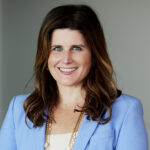June 2, 2022

Take That, Cheese! Julie Murchinson Interviews Aimee Quirk, CEO Ochsner Ventures
Dynamic Women Leading Healthcare in Dynamic Times
 With an industry the size of healthcare, offering such incredible need for innovation, and one that’s so critical to our “everything”, it’s not surprising to see people enter from other industries: successful companies bring different solutions, entrepreneurs start meaningful businesses, and highly-experienced executives join traditional healthcare organizations. The newcomers are making a difference, but suffer from the same ailments as the old guard: healthcare lacks focus and instead wallows in complexity, chaos and its snail’s pace…until it doesn’t. COVID drove laser focus on urgent problems to be solved and gaping holes of long-term needs. Those with the diverse experiences truly thrived.
With an industry the size of healthcare, offering such incredible need for innovation, and one that’s so critical to our “everything”, it’s not surprising to see people enter from other industries: successful companies bring different solutions, entrepreneurs start meaningful businesses, and highly-experienced executives join traditional healthcare organizations. The newcomers are making a difference, but suffer from the same ailments as the old guard: healthcare lacks focus and instead wallows in complexity, chaos and its snail’s pace…until it doesn’t. COVID drove laser focus on urgent problems to be solved and gaping holes of long-term needs. Those with the diverse experiences truly thrived.
Aimee Quirk, now the CEO of Ochsner Ventures, took her first healthcare role in 2015, heading the think tank / lab / healthcare-tech company called innovationOchsner. But this wasn’t her first pivot. Aimee started as a law clerk, then did complex commercial litigation for a global firm, Jones Walker. She then spent four years as the Senior Advisor for Economic Development to Mayor Landrieu of New Orleans, an administration with a big change mandate and innovation agenda. With the city and innovationOchsner, Aimee built ideas, models, coalitions, strategies and solutions to drive change.
No health system or leader was truly prepared for COVID, but Aimee’s diverse experiences meant she was comfortable with ambiguity and unknown complexity. The team she led at Ochsner, working with collaborators in the community and around the country, created solutions to short-term and lingering problems for the health system and for the community. And along the way, they built a business with long-term viability and diversified revenue.
Today, as CMS makes adjusted payments to hospitals available for sourcing domestically produced PPE, this business looks brilliant. In the middle of the pandemic, however, it took a creative leader and team to see the multifaceted value of growing an entirely different business out of both provider and community need. It also took on a big problem that commanded focus to drive the real value.
From Years Mired in Complexity Comes Resolute Clarity
While the law taught Aimee to see the complexity of a problem, running economic development strategy for New Orleans gave her hands-on experience with everyday challenges of the people of New Orleans and building solutions that worked.
 After her work on the mayor’s transition team, community leaders recommended she lead economic development. “I had been inspired working on the transition. The Mayor was assembling a great team, and the strong community support pushed me to make the jump. Needless to say my managing partner was surprised when I resigned from the partnership, but he was supportive.”
After her work on the mayor’s transition team, community leaders recommended she lead economic development. “I had been inspired working on the transition. The Mayor was assembling a great team, and the strong community support pushed me to make the jump. Needless to say my managing partner was surprised when I resigned from the partnership, but he was supportive.”
“For the city of New Orleans, I had to figure out how to work within existing government structures, which are not the most innovative. And then find the right private industry partners, who had more flexibility but also had their own agenda. Then together, we had to find common ground to solve a problem in a way that worked for both partners and created a community benefit.”
Aimee’s tenure with the city was one of the most instructive in her career, because she learned what she wanted to do. “I want to work with smart people who tackle hard problems, then solve them together. I know I can’t do it alone. And I want to build things.”
More importantly, she clarified her why.
“I want the impact of my work, at its core, to be beneficial for people on the street, regular people, my friends and family. The work we do has to matter to people on the street…That’s what drives me every day.”
With her focus on the needs of real people, her comfort in complexity and her success solving hard problems, Aimee brought unusual capabilities to a healthcare organization
pushing innovation.
“Why I do this? I get to work with really incredible people who contribute in different ways. We all help build solutions that drive better health in our communities. And that’s it.”
When COVID moved the world’s cheese and threatened the world’s health, it only intensified the need for innovation.
Obvious Problems Accelerated People-Centric Solutions
Throughout the industry, but most especially in organizations providing care, COVID forced everyone to adapt, to develop new skills, while every structure and aspect of our lives changed. Even leaders like Aimee who are comfortable with ambiguity and uncertainty, whose roles demand agility, felt themselves stretched.
“It was a big push on everything that we had learned about ambiguity, uncertainty, and agility. It was all tested in a really deep way. At the beginning of the pandemic there was so much unknown, so much need, that we had to figure out what could make the most difference right at that time and would have lasting effects. I had to sharpen a lot of skill sets.”
With such an unthinkable crisis, provider organizations and their leaders had to prioritize and act on just the most critical issues.
“It was almost easier and faster to get stuff done. Look at the acceleration of virtual care, or testing, rolling out the vaccine. There weren’t 50 million distractions and shiny objects. The focus made it easier to bring them along, help them adapt faster than they could have in a normal time.”
Solving a Life-or-Death Problem
Every provider organization faced PPE shortages to some degree, and at major health systems like Ochsner it very quickly became a matter of life or death. Getting PPE for frontline clinicians was immediately a top need. While supply chain leaders worked their channels, others needed to innovate.
innovationOchsner (iO)’s lab had proto-typing and 3D printing capabilities. Aimee convened doctors, Ochsner’s supply chain team, industry and community resources they hadn’t worked with before. The task force quickly mapped out a plan to create the PPE Ochsner needed. Producing that PPE, solving that immediate need became a full-time focus for Aimee, followed by many months for her team.
“It worked out beautifully because we went to existing local companies, asking them to make gowns and masks. Companies with fashion and retail workforces that weren’t working. We were able to keep jobs going in the local community, doing work that really helped with the immediate crisis. But that was only a short-term plan, because without automation they could only produce so much.”
“Knowing we couldn’t get the necessary quantity and breadth of products, we developed phase two at practically the same time. We contacted manufacturers around the country with different degrees of automation, suppliers from all over who would work to the specs our clinical teams created. For example, the Amish community made gowns. We were trying to scale manufacturing locally and across the country, while our supply chain team maximized traditional sources.”
All health systems had to stretch for new ways to get PPE, and some arranged local manufacturing in the first crisis. Ochsner took another step with direct sourcing agreements beyond its local footprint. And then Aimee and her team made the game-changing move.
“We did not want our providers and care teams to worry about having access to the equipment they needed to care for our patients, and we knew we had to control our own destiny.”
PPE manufacturing is a big departure from Ochsner’s core business, so the team knew it needed an external partner. A board member introduced the team to people with automotive manufacturing experience, then clinical and supply-chain teams worked the problem.
“Can we get the equipment? What will it cost, will we make money? What’s the capital investment? We worked through all that, and in a few months we had a business plan that our executive team thought was viable, interesting, even compelling. I think of this as phase three, a multimillion-dollar project that enabled our core business. And our board agreed.”
“We solved a business problem for us, for other healthcare organizations and other industries that need PPE, like food processing. We created a new revenue stream, separate from our core business, and diversification can help not-for-profits meet more community needs. And we created an economic development win in our core community – 1,200 new jobs in our region, one that’s been distressed by the oil and gas industry.”
In April 2022, Aimee toured the plant with a group of our physicians and MD leaders, and celebrated the one-year anniversary with employees. “Their emotion was palpable, and it gave me chills and such joy to have played a part in it.”
“We all come at our work from a different starting point based on our lived experiences and role, whatever we’re being measured on. But I think we could all benefit from prioritization and focus, collectively. And COVID provided that to the world. Outside of a crisis, organizations need to focus and align — so we’re working on three things collectively, not twenty. Even when there are so many things we want to improve.”
Sustainable Business Born Out of the Necessity to Save Lives
When Aimee started at Ochsner she never expected to develop a PPE manufacturing operation. It certainly fit her “hard problem” criteria and her “why” as the business helps ordinary people. But Aimee looks at the larger picture.
“What did I learn? That we don’t have to think about ourselves in a certain box. We have expertise, resources, talent, and a capacity to get things done that creates different benefits for different types of people.”
“In every phase, I knew we had to collaborate to make this work. And health systems don’t always think about collaboration. I challenge health system leaders to think about how we can set ourselves up so it’s easier for others to work with us.” The PPE deal was a big moment at Ochsner because it really stretched the health system into a new dimension of possibilities for what could be done, how it could be done, and the incredible value it would create.
Aimee intends to use this same intense focus and speed on other projects and hopes colleagues will be comfortable with that. “How can we take what we learned in this non-digital space, our thinking and speed, and apply that to other areas? Can diversification and collaboration take Ochsner to the next level?”
She posits that a health system trying to be everything to everyone isn’t a sustainable business model. Health systems need to think about “what we should stop doing so we can commit to the things that are more impactful, sustainable.”
And to the “funders, entrepreneurs and everyone else, I challenge you to really think about how we all think differently and more collaboratively to have more impact. It’s a seismic shift we’ve been talking about for a long time, it just hasn’t happened.”
Diverse Perspectives + Relentless Focus = Sustainable Innovation
How does a mammoth industry replicate elements of this to scale real, sustainable change?
 First, diversity rules…diverse values, experiences, perspectives and roles. In this case, leaders who are comfortable with ambiguity, complexity and collaboration may be purpose-built to rethink healthcare’s future.
First, diversity rules…diverse values, experiences, perspectives and roles. In this case, leaders who are comfortable with ambiguity, complexity and collaboration may be purpose-built to rethink healthcare’s future.
Second, focus is everything. It’s hard to focus when the health system attempts to be all things to all people, a business model that is increasingly difficult to sustain without breaking the proverbial bank. Developing a focused strategy for how the health system OPTIMALLY serves its community will make a difference…just like it did for Aimee and team. The writing is on the wall for systems continuing the “everything for everyone” model. It’s time to focus on the big problems at hand.
Lastly, health systems are a critical part of their community’s economy which makes it even more imperative to incorporate the community into tomorrow’s solution. It will take a village to care for the whole person, so collaboration rules.
Aimee Quirk is the CEO of Ochsner Ventures. In this role, Quirk leads development and management of Ochsner Health’s portfolio of strategic investments in emerging companies and venture funds as well as other diversified investments and businesses. Quirk previously served as CEO of innovationOchsner, an innovation lab and health tech company formed in 2015, which has developed several nationally recognized digital health solutions. Quirk also played a key leadership role in the development of SafeSource Direct, a Louisiana-based manufacturer of PPE launched in response to global supply chain challenges during the COVID-19 pandemic. Prior to joining Ochsner in 2015, Quirk served as the Senior Advisor for Economic Development for Mayor Mitch Landrieu, and prior to her public service, she was a partner in the law firm Jones Walker. Quirk is active on several corporate and non-profit boards and has been recognized by Becker’s Hospital Review as among Women in Health IT to Watch and a Woman of the Year and a Healthcare Hero by CityBusiness Magazine.





